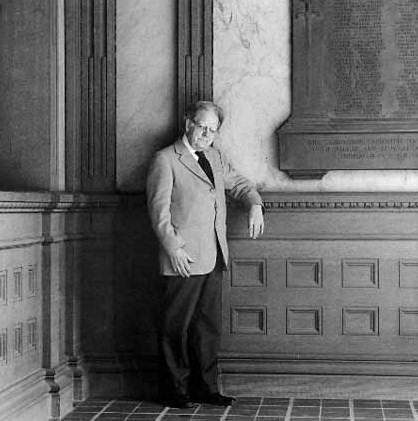
Michelangelo, Isaiah
Lecture 9. December 2, 1947
The king is regarded as the archetypal man in whom all the people who follow him find their own being. This is based on the idea that man is part of a larger human being. To see society as a larger self we must move from atomic individualism to some kind of abstract idea. Man sees in society only himself and others like him, but knows there is more than must a mere aggregate of individuals.
“Body” and “being” are vague terms. The essential thing is that society is seen as a human form, larger than the person. That’s what man expresses in the king—the larger body of society. He picks out a concrete symbol to express that idea. The king is an individual and. at the same time, the larger human being. Cannibals express literally that they are members of a single human body. There is a certain distrust of the king in the story of Saul; he is seen as something of an idol.
The Israelites saw in Egyptian culture the idolizing of the king. Thus, deliverance from Egypt meant deliverance from the divine man, Pharaoh. When the Israelites pick a king, it develops from the genuineness of kingship. Instead of a physical idol, they saw the spiritual reality that the king symbolizes and that all subjects are united in a common human body. David rejoices, repents of his sins, etc., because he is the King. The individual worshipper says that David is myself, my larger human body in which I find myself. David is the typical man; therefore, each worshipper goes through his emotions when he says his Psalms.
The idea of kingship carried with it one important factor: the King in the Old Testament is not divine. And yet, there is danger in an idol and a danger in making the spiritual abstract. The danger of idolatry must be faced. The concrete symbol must be the king representing the larger human body; the concrete stands for the symbol and has to be the flesh incarnate.
The king is society incarnate in a man. He is Israel incarnate because Israel is the larger human body of society. The Bible doesn’t use abstract ideas. It doesn’t use the term “society,” but Israel, or Jacob. The king, therefore, is the Son of Israel, the incarnate form of Israel, the Son of Man. Accepting the divine king in spiritual form is the consolidation of the symbol. We see that the most primitive is often the form of the most highly developed. The most crude form of the cannibal feast is the real form of the highest development at the other end.
Continue reading →

